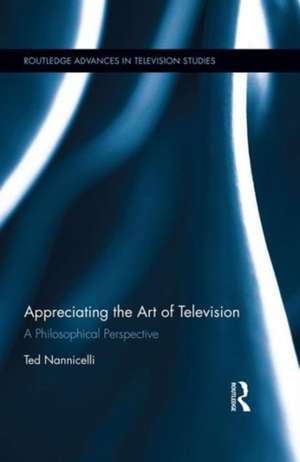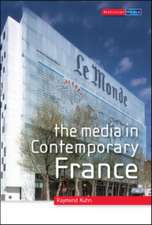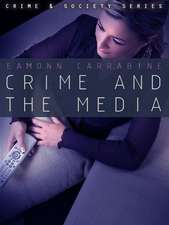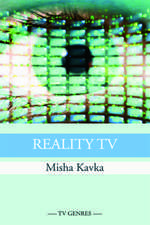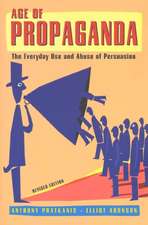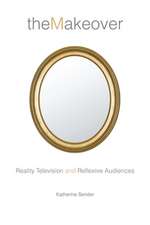Appreciating the Art of Television: A Philosophical Perspective: Routledge Advances in Television Studies
Autor Ted Nannicellien Limba Engleză Hardback – 10 oct 2016
| Toate formatele și edițiile | Preț | Express |
|---|---|---|
| Paperback (1) | 380.95 lei 6-8 săpt. | |
| Taylor & Francis – 10 dec 2019 | 380.95 lei 6-8 săpt. | |
| Hardback (1) | 823.99 lei 6-8 săpt. | |
| Taylor & Francis – 10 oct 2016 | 823.99 lei 6-8 săpt. |
Din seria Routledge Advances in Television Studies
-
 Preț: 310.55 lei
Preț: 310.55 lei -
 Preț: 303.89 lei
Preț: 303.89 lei -
 Preț: 350.96 lei
Preț: 350.96 lei -
 Preț: 395.93 lei
Preț: 395.93 lei -
 Preț: 437.71 lei
Preț: 437.71 lei - 30%
 Preț: 849.37 lei
Preț: 849.37 lei -
 Preț: 380.95 lei
Preț: 380.95 lei -
 Preț: 377.09 lei
Preț: 377.09 lei -
 Preț: 383.33 lei
Preț: 383.33 lei - 19%
 Preț: 256.78 lei
Preț: 256.78 lei - 21%
 Preț: 250.93 lei
Preț: 250.93 lei -
 Preț: 374.21 lei
Preț: 374.21 lei -
 Preț: 372.30 lei
Preț: 372.30 lei - 16%
 Preț: 255.83 lei
Preț: 255.83 lei -
 Preț: 477.38 lei
Preț: 477.38 lei - 21%
 Preț: 250.96 lei
Preț: 250.96 lei -
 Preț: 365.37 lei
Preț: 365.37 lei -
 Preț: 368.43 lei
Preț: 368.43 lei -
 Preț: 392.93 lei
Preț: 392.93 lei -
 Preț: 311.28 lei
Preț: 311.28 lei - 18%
 Preț: 1002.80 lei
Preț: 1002.80 lei -
 Preț: 369.19 lei
Preț: 369.19 lei -
 Preț: 389.66 lei
Preț: 389.66 lei -
 Preț: 373.26 lei
Preț: 373.26 lei - 18%
 Preț: 1000.27 lei
Preț: 1000.27 lei - 18%
 Preț: 947.90 lei
Preț: 947.90 lei - 9%
 Preț: 934.84 lei
Preț: 934.84 lei
Preț: 823.99 lei
Preț vechi: 1180.55 lei
-30% Nou
Puncte Express: 1236
Preț estimativ în valută:
157.69€ • 164.02$ • 130.18£
157.69€ • 164.02$ • 130.18£
Carte tipărită la comandă
Livrare economică 12-26 aprilie
Preluare comenzi: 021 569.72.76
Specificații
ISBN-13: 9781138840782
ISBN-10: 1138840785
Pagini: 242
Ilustrații: 40
Dimensiuni: 152 x 229 x 19 mm
Greutate: 0.68 kg
Ediția:1
Editura: Taylor & Francis
Colecția Routledge
Seria Routledge Advances in Television Studies
Locul publicării:Oxford, United Kingdom
ISBN-10: 1138840785
Pagini: 242
Ilustrații: 40
Dimensiuni: 152 x 229 x 19 mm
Greutate: 0.68 kg
Ediția:1
Editura: Taylor & Francis
Colecția Routledge
Seria Routledge Advances in Television Studies
Locul publicării:Oxford, United Kingdom
Public țintă
Postgraduate and UndergraduateCuprins
Introduction
1. Authorship and Agency
2. The Medium
3. Ontology
4. Interpretation I
5. Interpretation II
6. Evaluation
1. Authorship and Agency
2. The Medium
3. Ontology
4. Interpretation I
5. Interpretation II
6. Evaluation
Recenzii
"Ted Nannicelli's Appreciating the Art of Television is a signal intervention into the burgeoning field of television aesthetics. Nannicelli draws on contemporary analytic philosophy of art to advance compelling, often original arguments about the authorship and ontology of television works, television's distinctiveness as a medium, the role of authorial intentions in the audience's interpretation of television works, and the evaluation of television as an art. His theorizing is characterized by impeccable clarity and rigor, and he mounts formidable challenges to arguments that are commonplace in TV studies: that fans determine the meanings of television works, for example, or that there is nothing objective about the evaluation of television as an art. These claims will have to be reckoned with by anyone seeking to understand the nature of television as an art and our appreciation of it, and this book is therefore required reading for those interested in the aesthetics of television." Malcolm Turvey, Sarah Lawrence College, USA
"This is an exciting and valuable book project, where Nannicelli brings together two lines of inquiry – analytical aesthetics and philosophy of film on the one hand and television studies on the other. Specifically, he explores how an intentionalist approach can solve a series of philosophical problems indirectly evident in many accounts in television studies. Through careful discussion he disentangles these philosophical problems and presents an original contribution to the emerging field of television aesthetics. Philosophically minded media scholars and philosophers interested in television will learn from and enjoy this book." -Margrethe Bruun Vaage, University of Kent, UK
"This is an exciting and valuable book project, where Nannicelli brings together two lines of inquiry – analytical aesthetics and philosophy of film on the one hand and television studies on the other. Specifically, he explores how an intentionalist approach can solve a series of philosophical problems indirectly evident in many accounts in television studies. Through careful discussion he disentangles these philosophical problems and presents an original contribution to the emerging field of television aesthetics. Philosophically minded media scholars and philosophers interested in television will learn from and enjoy this book." -Margrethe Bruun Vaage, University of Kent, UK
Descriere
This book aims to provide scholars active in television aesthetics with a critical overview of the relevant philosophical literature, while also giving philosophers of film a particular account of the art of television that will hopefully spur further interest and debate.
